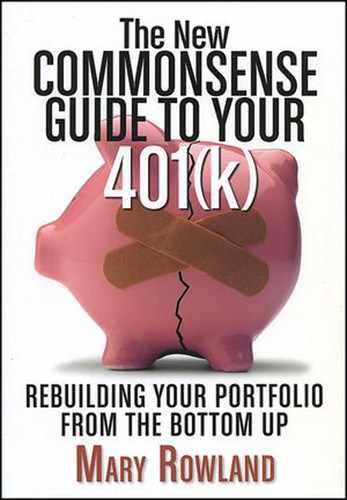IF YOU ARE A MATHEMATICIAN or an engineer, you're going to love this. If you're an artist or an English major, it's worth your trouble to see it through. An index fund—or a passively managed fund—invests in all the stocks that make up a particular index or in a sampling of those stocks. Once invested, the fund is passive, simply holding the stocks. No active manager picks and chooses stocks or receives a fee for management. Fees are low. A good index fund moves up and down with the market. The Vanguard Index Trust charges 18 percent of 1 percent, or 18 basis points, in expenses. That compares to 1.19 percent or 119 basis points, for the industry average, according to Lipper Analytical Services.
Passive management grew out of the work in efficient market theory of a number of economists in the 1960s. John C. Bogle, founding chairman of the Vanguard Group, explains efficient market theory this way in his books:
All investors together own the entire stock market. Passive investors as a group will match the gross return of the overall market because they are invested in all the stocks. So, active investors, as a group, can do no better. They, too, must simply match the market.
Because the fees and transaction costs incurred by the passive investors are much lower than those paid by active investors, and both groups get the same gross returns, it follows that passive investors will get the higher net returns. Indeed, active managers must beat the market by 2 percentage points just to come out even after paying expenses.
Yes, I hear you saying, but active managers as a group include some good managers and some bad managers. You are going to choose the good ones—the ones that beat the average—while I choose the losers. Bogle concedes that a handful of excellent managers outperform the market, people like, for instance, Warren Buffett. But, he says, such extraordinary managers not only are few in number but are difficult to identify in advance. Not only that, but the recent market debacle did something to bring down the giants, too. Consider this: A $20.50 investment in Buffett's Berkshire Hathaway fund in 1967 when it opened would have grown to $141,600 at the end of 2007, an annualized return of 24.73 percent over the fund's first forty years. But in 2008, Berkshire lost 32.1 percent, it worst annual loss by far. And in the first half of 2009, it lost another 7.5 percent. Will it regain its footing? Who knows?
Bogle cites academic studies that show that only two in five stock mutual funds outperform the market over time and only one in five does so once sales charges are taken into account. The performance of active managers is inconsistent, and it is usually not the same ones who outperform from year to year.
When the studies on passive management were done in the 1960s, big institutional investors like pension funds immediately recognized their merits. The first institutional index fund was opened in 1971, and billions of dollars poured into these funds throughout the 1970s. The first retail index fund, the Vanguard 500 Index, set up by Bogle in 1976, had a tougher row to hoe. The indexing story lacked romance and passion—the two emotions that lure fickle individual investors like us. Bogle's fund began to grow in the 1980s as these investors began to see the logic of passive investing. In 1995 and 1996, money poured into the fund, bringing it to number two in size behind Magellan and putting the index fund in the unlikely position of the "hot fund" of the year.
Much of this money came into the fund for the wrong reason. Many new shareholders did not understand that an index fund moves up and down along with the index with a slight difference for expenses. These investors selected the Index 500, because they thought it "hot" rather than for the mathematical reasons outlined by Bogle in his many books, such as Common Sense on Mutual Funds (a revised and updated edition is due out November 2009). Many of the investors who piled into the Index 500 in the mid-nineties merely saw that Bogle's once-ignored index fund was outperforming most other funds.
Today, mutual funds are available on hundreds of indexes. In the spring of 2009, Vanguard brought out an international small-cap index fund, Vanguard® FTSE All-World ex-US Small-Cap Index Fund (VSS), intended to track the investment performance of small company stocks around the world, excluding those in the United States. This Vanguard investment is an exchange-traded fund (ETF). Nearly all ETFs are index funds. More about them coming up in section 23 of this chapter.
